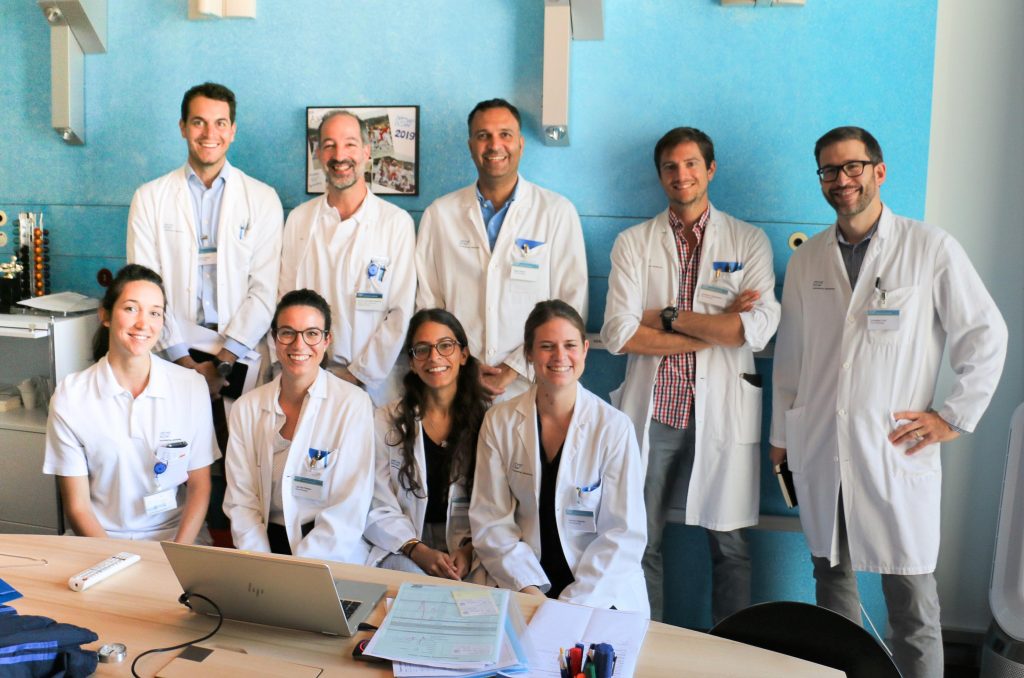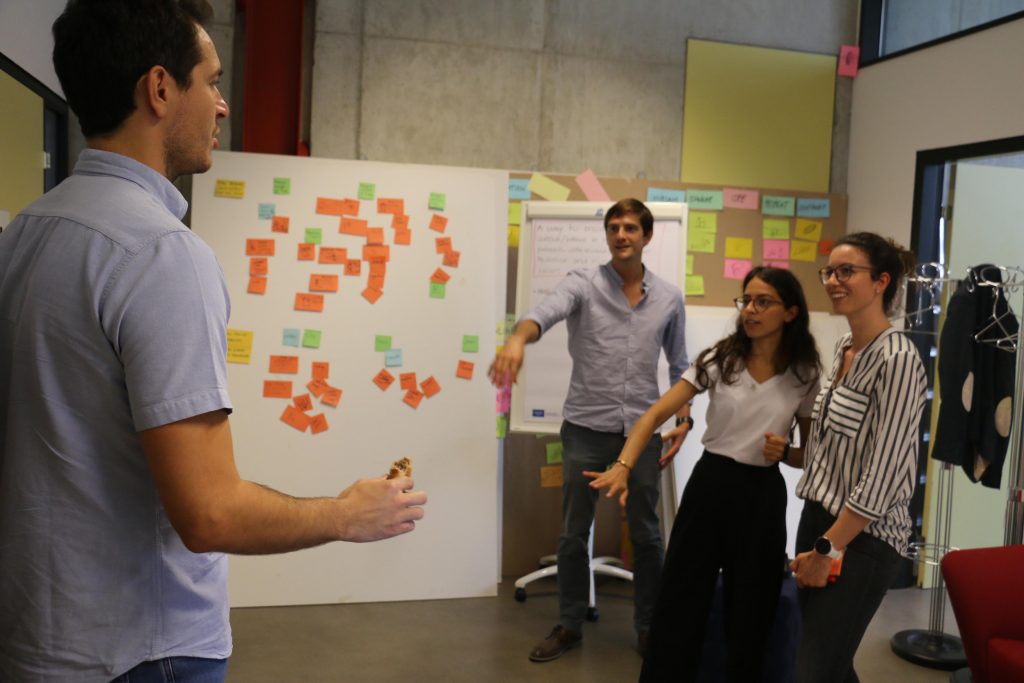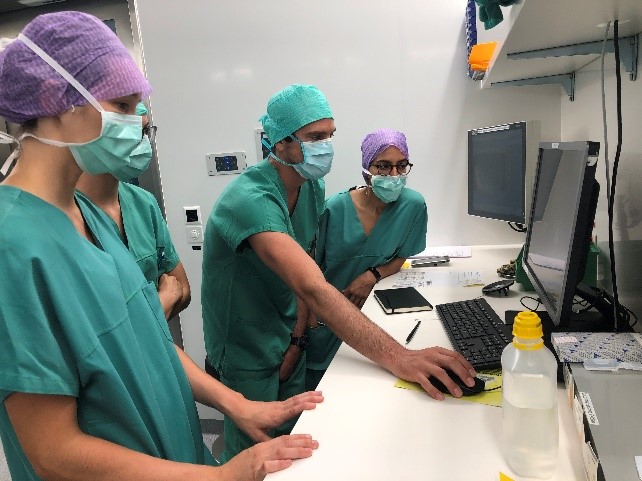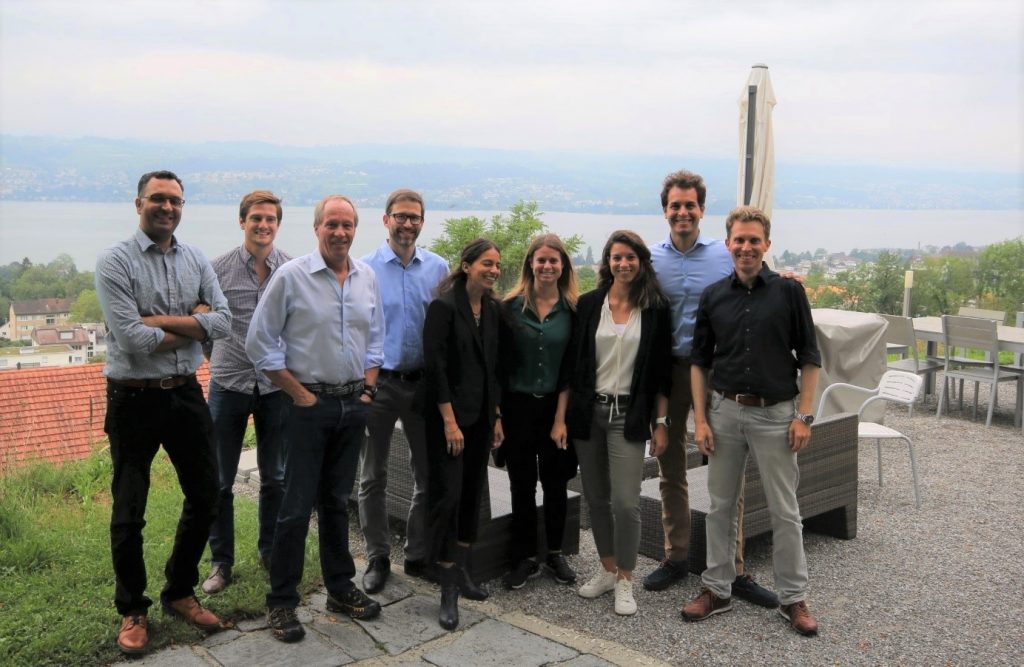Fortschritt in der Medizin ist eng verbunden mit medizintechnischen Innovationen. Meist erst durch diese wird es möglich klinische Ergebnisse oder die Kosteneffizienz deutlich zu verbessern. Doch wie können Behandler und Produktentwickler im zunehmend regulierten, kostenintensiven Gesundheitswesen noch radikal neuartige Produktideen entwickeln?
Dieser Herausforderung widmeten sich im vergangenen Herbst zwei internationale Teams im ersten Swiss Biodesign Bootcamp. Dieses wurde organisiert von der ZHAW und dem Kantonsspital Winterthur. Das übergeordnete Ziel dieses Innovationsmanagementkurses: Intra- und Entrepreneuren einen systematischen Prozess zu vermitteln, um Bedürfnisse und Marktchancen jenseits existierender Produktlösungen zu identifizieren. Der berufsbegleitende Kurs basiert dabei auf dem international bewährten, praxisorientierten Biodesign Trainingsprogramm der renommierten Stanford University. Neben Prof. Tom Krummel und Dr. Orestis Vardoulis aus Stanford, kamen ausgewiesene MedTech-Innovationsexperten von ETH, ZHAW, Unternehmen, Start-ups und Early-Stage Investoren zum Einsatz. Die maximal 12 Teilnehmenden aus Medizin, Technik und Betriebswirtschaft bilden während der Weiterbildung drei- bis vierköpfige, interdisziplinäre Projektteams und arbeiten ab dem ersten Tag wie im Start-up: Mit dem Ziel ein konkretes Medizinprodukt zu konzeptionalisieren und die Managementaufgaben eines Produktentwicklers unter realen Bedingungen kennenzulernen. Mit diesem anwendungsorientierten Ansatz ist es Biodesignern aus Stanford gelungen bereits Dutzende neuer MedTech-Produkte und sehr erfolgreicher Startups zu erschaffen.

Beobachten statt Befragen als Erfolgsrezept
Aus der Design Thinking Forschung ist bekannt, dass Menschen die wenigsten ihrer Bedürfnisse verbal kommunizieren. Daher fokussiert Biodesign darauf Patienten und Behandelnde nicht nur zu befragen, sondern ihr Verhalten und Behandlungsumfeld genau zu beobachten. Doch wie funktioniert das konkret? Dazu der Studiengangleiter, Dr. Jens Haarmann: «In der Clinical Immersion-Phase begleiten die Teilnehmenden Operationen, Konsultationen und Fallbesprechungen. Es ist dabei erstaunlich wie schnell sich der Blick schärft, scheinbar Selbstverständliches hinterfragt wird und die Projektteams auf 30-40 Ansatzpunkte für potenzielle Innovationen kommen.»

Im vergangenen Jahr erfolgte dies in der Viszeralchirurgie am Kantonsspital Winterthur (KSW), in der die Teilnehmenden über mehrere Tage sämtliche Aspekte des Alltags in einer grossen chirurgischen Abteilung hautnah erleben konnten. Seitens des KSW wurde der Kurs von Chefarzt Prof. Dr. Michel Adamina begleitet, welcher den Nutzen aus seiner Sicht prägnant zusammenfasst: «Die Clinical Immersion war für die Teilnehmer und die Klinik eine spannende Zeit regen Austausches zu unterschiedlichsten klinischen Bedürfnissen, sowie neuen Einblicken in die technischen und marktseitigen Aspekte einer globalen Produktentwicklung.»

Während der anschliessenden Entwicklung der eigentlichen Produktideen wurden die Projektteams von branchenerfahrenen Experten zu Marktanalysen, Intellectual Property, Regulatory, Market Access, Health Economics und zur Business Plan-Entwicklung intensiv gecoacht. Aus der schrittweisen Konkretisierung und Priorisierung resultierten am Schluss zwei innovative Produktlösungen: Ein Smart Stoma Device und ein neues GERD Antireflux-Implantat. Prof. Krummel, Stanford Biodesign Co-Director und Gastreferent im Swiss Biodesign Programm meint dazu: «Da Biodesign in Stanford ein mehrmonatiges Vollzeitprogramm ist, wussten wir nicht genau, welche Ergebnisse wir in einem Teilzeitkurs erwarten konnten. Dass ein Projektteam in der vergleichsweise kurzen Zeit sogar bis zu einer Patentanmeldung kam, zeigt mir, dass der Biodesign-Prozess auch im hocheffizienten Swiss Biodesign-Format funktioniert.»
Nach dem erfolgreichen Piloten wird das Bootcamp im Jahre 2020 als ausgewachsener CAS Swiss Biodesign for MedTech Innovators fortgeführt. Der genaue, medizinische Themenbereich für die Clinical Immersion variiert jedes Jahr und wird erst zum Kursbeginn bekannt gegeben. Soviel kann aber bereits gesagt werden: Der diesjährige Hauptpartner der Clinical Immersion ist die Balgrist Universitätsklinik in Zürich.
Kantonsspital Winterthur – Swiss Biodesign Fellowship Award
Die medizinischen Partnerkliniken des Swiss Biodesign Programms vergeben jedes Jahr einen Innovation Fellowship Award. Dieser ermöglicht es Jungmedizinern mit ausserordentlichem, klinischem Leistungsausweis und Interesse an MedTech/HealthTech Innovationen eine gebührenfreie Teilnahme am Managementkurs.

Der KSW – Swiss Biodesign Fellowship Award ging im Jahre 2019 an Dr. Jonathan Douissard vom Universitätsspital Genf (zweiter von links).
English Version
Swiss Biodesign – An application-oriented training concept for radical MedTech innovation in cooperation with Stanford University
Progress in medicine is closely linked to innovations in medical technology. It is oftentimes through new medical devices that clinical results or cost efficiency can be significantly improved. But how can clinicians and product developers still develop radically new product concepts in an increasingly regulated, cost-intensive healthcare system?

This challenge was addressed by two international teams at the first Swiss Biodesign Bootcamp last autumn. The part-time program was organized by the ZHAW and the Kantonsspital Winterthur. The overall goal of this innovation management course: To give intra- and entrepreneurs a systematic process to identify needs and market opportunities beyond existing product solutions. The extra-occupational course is based on the internationally proven, practice-oriented Biodesign training program of the renowned Stanford University. In addition to Prof. Tom Krummel and Dr. Orestis Vardoulis from Stanford, proven MedTech innovation experts from ETH, ZHAW, companies, start-ups and early-stage investors were involved.
The participants from the fields of medicine, technology and business administration formed interdisciplinary project teams of three persons during the training and worked from day one as if they were in a start-up: with the aim of conceptualising a concrete medical product and getting to know the management tasks of a product entrepreneur under real conditions. With this application-oriented approach, biodesigners from Stanford have already succeeded in creating dozens of new medtech products and very successful start-ups.
Observing instead of interviewing as a recipe for success
From design thinking research, it is known that only a small part of individual needs are communicated verbally. Therefore, Biodesign focuses on not only interviewing patients and caregivers, but also observing their behavior and treatment environment. But how does this work in practice? Jens Haarmann, head of the course, says: „In the clinical immersion phase, participants accompany operations, consultations and case discussions. It is astonishing how quickly the participants sharpen their view, question seemingly self-evident facts and the project teams come up with 30-40 starting points for potential innovations.“

Last year, this took place in the Visceral Surgery Department at the Cantonal Hospital Winterthur (KSW), where the participants were able over several days to experience up close all aspects of everyday life in a large surgical department. On the part of the KSW, the course was accompanied by Chief Physician Prof. Dr. Michel Adamina, who summarized the benefits from his point of view: „The Clinical Immersion was an exciting time of lively exchange on the most varied clinical needs, as well as new insights into the technical and market aspects of global product development.“

During the subsequent development of the actual product ideas, the project teams were coached closely by industry experienced experts on market analysis, intellectual property, regulatory, market access, health economics and business plan development. The gradual prioritization of needs and concepts resulted in two innovative product solutions: A Smart Stoma Device and a new GERD anti-reflux implant. Prof. Krummel, Stanford Biodesign Co-Director and guest speaker in the Swiss Biodesign Program comments: „Since Biodesign at Stanford is a full-time program lasting several months, we did not know exactly what results we could expect in a part-time course. The fact that a project team even managed to apply for a patent in the comparatively short time shows me that the biodesign process also works in the highly efficient Swiss Biodesign format„.
After the successful pilot, the Bootcamp will be continued in 2020 as a full-fledged CAS Swiss Biodesign for MedTech Innovators. The exact medical subject area for the Clinical Immersion varies each year and will be announced at the beginning of the course. But this much can already be said: This year’s main partner for Clinical Immersion is Balgrist University Hospital in Zurich.
Winterthur Cantonal Hospital – Swiss Biodesign Fellowship Award 2019
The medical partner clinics of the Swiss Biodesign Programme offer two Innovation Fellowship Awards every year. This award is available to young doctors and researchers with an outstanding clinical track record and interest in MedTech/HealthTech innovation.

In 2019, the KSW – Swiss Biodesign Fellowship Award went to Dr. Jonathan Douissard of the University Hospital of Geneva (second from left).